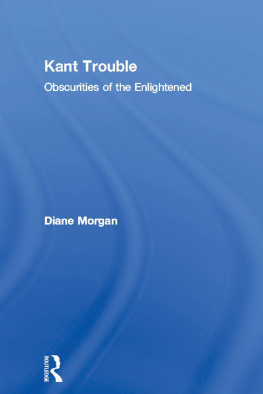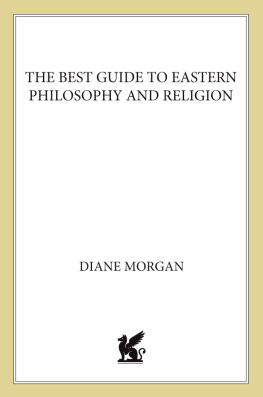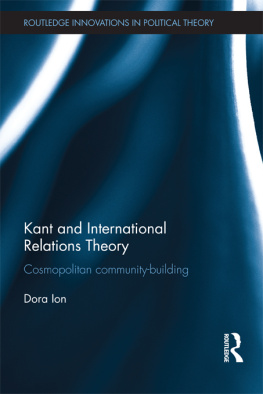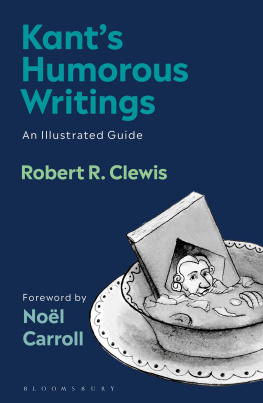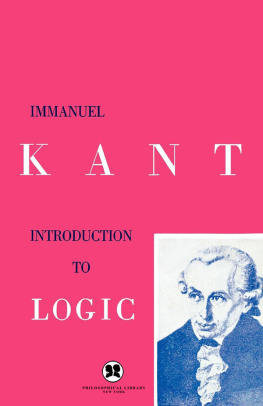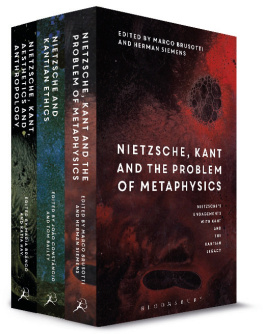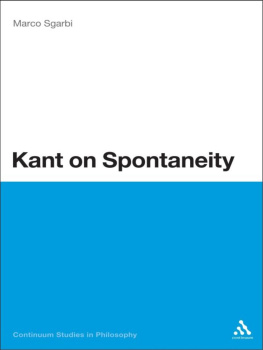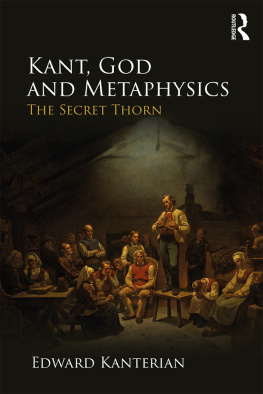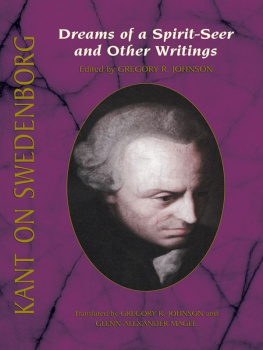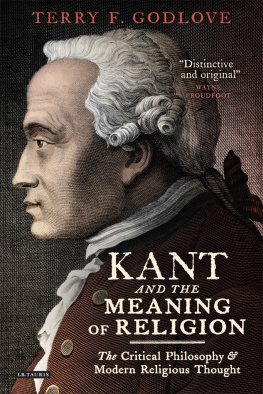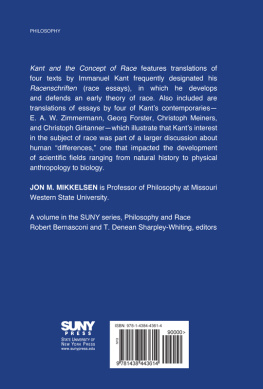Kant Trouble
This is a wonderfully rich and suggestive book which is sure to have a large and enthusiastic readership among students of cultural and literary theory. It is full of original observations that shed new light both on the intrinsic interest of Kants thought and on his relation to other thinkers and movements of his time and ours. Not least of its virtues, the study displays a rare combination of sympathy for its subject and critical distance, resulting in a reading that is both generous and searching.
Susan Shell, Boston College
Kant Trouble: The Obscurities of the Enlightened offers a highly original and incisive reading of Kants philosophy.
Diane Morgan focuses her investigation on a radical reappraisal of Kants writings on architecture, justice and ethics, faith in progress, chemistry, life and matter. Throughout her study Morgan challenges the widely held view of Kant as the exponent of a rigid and restricting rationality. She argues that the philosophers professed aim in The Critique of Pure Reason to attain an airtight architectonic mode of reasoning is in fact a project which never really gets off the ground. Even before its inception it is troubled by Kants intriguing explorations of other, ultimately more intriguing, ideas.
Morgan goes on to provide a convincing analysis of themes apparently of minor interest to Kant and Kantian studiessuch as landscape gardening, freemasonry, chemical affinities and Egyptologyand demonstrates that these are in fact of major importance to a philosopher well capable of accommodating troubling and subversive ideas. This compelling discussion arrives at a fresh and ground breaking perspective on Kant, whereby he is no longer to be regarded as a concrete rationalist but as a daring thinker, not afraid to entertain ideas highly threatening to his own system and to the humanist legacy of the Enlightenment.
Diane Morgan is Senior Lecturer in Literary and Cultural Studies at University College, Northampton.
Warwick Studies in European Philosophy
Edited by Andrew Benjamin
Professor of Philosophy, University of Warwick
This series presents the best and most original work being done within the European philosophical tradition. The books included in the series seek not merely to reflect what is taking place in European philosophy but also to contribute to the growth and development of that plural tradition. Work written in the English language as well as translations into English are included, engaging the tradition at all levelswhether by introductions that show the contemporary philosophical force of certain works, collections that explore an important thinker or topic, or in significant contributions that call for their own critical evaluations.
Titles already published in the series:
BATAILLE
Writing the sacred
Edited by Carolyn Bailey Gill
EMMANUEL LEVINAS
The genealogy of ethics
John Llewelyn
MAURICE BLANCHOT
The demand of writing
Edited by Carolyn Bailey Gill
BODY- AND IMAGE-SPACE
Re-reading Walter Benjamin
Sigrid Weigel (trans. Georgina Paul)
PASSION IN THEORY
Conceptions of Freud and Lacan
Robyn Ferrell
HEGEL AFTER DERRIDA
Writing the sacred
Edited by Stuart Barnett
RETREATING THE POLITICAL
Philippe Lacoue-Labarthe and Jean-Luc Nancy
DELEUZE AND PHILOSOPHY
The difference engineer
Edited by Keith Ansell Pearson
ON JEAN-LUC NANCY
The sense of philosophy
Edited by Darren Sheppard, Simon Sparks and Colin Thomas
VERY LITTLEALMOST NOTHING
Death, philosophy, literature
Simon Critchley
BLANCHOT
Extreme contemporary
Leslie Hill
TEXTURES OF LIGHT
Vision and touch in Irigaray, Levinas and Merleau-Ponty
Cathryn Vasseleu
ESSAYS ON OTHERNESS
Jean Laplanche
PHILOSOPHY AND TRAGEDY
Miguel de Beistegui and Simon Sparks
HYPOCRITICAL IMAGINATION
Writing the sacred
John Llewelyn
Kant Trouble
The obscurities of the enlightened
Diane Morgan
First published 2000
by Routledge
11 New Fetter Lane, London EC4P 4EE
Simultaneously published in the USA and Canada
by Routledge
29 West 35th Street, New York, NY 10001
Routledge is an imprint of the Taylor & Francis Group
This edition published in the Taylor & Francis e-Library, 2002.
2000 Diane Morgan
All rights reserved. No part of this book may be reprinted or reproduced or utilized in any form or by any electronic, mechanical, or other means, now known or hereafter invented, including photocopying and recording, or in any information storage or retrieval system, without permission in writing from the publishers.
British Library Cataloguing in Publication Data
A catalogue record for this book is available from the British Library
Library of Congress Cataloging-in-Publication Data
Morgan, Diane
Kant trouble: the obscurities of the enlightened/Diane Morgan.
p. cm.(Warwick studies in European philosophy)
Includes bibliographical references and index.
(alk. paper)
1. Kant, Immanuel, 1724-1804. I. Title. II. Series.
B2798.M69 2000
193.21-dc21 99-044820
ISBN 0-203-45169-4 Master e-book ISBN
ISBN 0-203-75993-1 (Adobe eReader Format)
ISBN 0-415-18352-9 (hbk)
ISBN 0-415-18353-7 (pbk)
TO MY PARENTS AND BROTHER, WITH LOVE
Contents
This book is a rewritten version of my doctoral thesis, entitled The Obscurities of the Enlightened: Reflections on Kantian Blind Spots and submitted in 1993 to the University of Sussex. My supervisor was Geoffrey Bennington, and I take this opportunity to thank him for his helpful guidance. My examiners were Howard Caygill and George Craig, and I am also grateful to them both for their encouraging enthusiasm for the project. The first version of was given as a paper to Jacques Derridas seminar at the Ecole des Hautes Etudes in Paris under the title Trois cas de ddou-blement: Ka, Kant et Kantorowicz in February 1990. The concluding chapter was also given as a paper at Derridas seminar in March 1993 with the title La Rvlation de limpossibilit de la rvlation: Kant, Hamann et Hegel. While researching this project, I benefited greatly from Derridas seminars and from others at the Collge International de Philosophie in Paris. Also indispensable was a DAAD (German Academic Exchange Service) scholarship for the academic year 19901, which permitted me to study at the Comparative Literature Institute (AVL) and Philosophy Department of the Freie Universitt, Berlin.
My experience of reading Kant has been that he is at times most strange, sometimes even outlandish in his ideas, but consistently intriguing and even exciting. Having later read Kleists description of his strong reaction to Kantian philosophy, one that led to an existential crisis, I saw that his sense of compelling urgency, that here was a philosophy which was at times radically questioning the foundations we traditionally rely on to orient ourselves in the world, was missing from much Kantian commentary. Kant is far from being just the Knigsberger eccentric whose movements were so regular that people set their watches by him and whose philosophy aims at all costs to establish domestic security.
This book draws on a wide range of Kants textssome of them still not available in English translationthereby overriding the distinction that commentators sometimes make between the pre-critical writings and what follows, and giving much attention to the Anthropology, often treated disparagingly as the late work of a senile old man. It also draws very widelyon other areas not usually associated with Kant studies, which necessitates lengthy forays into the disciplines of architecture and literary/cultural studies. This goes some way towards justifying the unconventional layout of the text: a very long introduction, subdivided into shorter sections, and a substantial conclusion, which introduces new figures as well as returning to previously explored ideas. After much thought, I decided to retain this unusual structure, as one of my central concerns in this book is precisely to speculate on an alternative to the traditional architectonic or, to use Kants words art of constructing systems, with its assumptions about laying down foundations and building securely and determinedly up from them. The burgeoning form of this book seemed apposite for a work that intends itself to be suggestive, an opening up of debate, rather than an authoritative closing of it.

